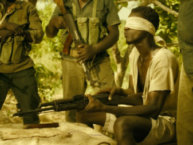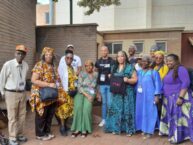 Gloria Mwaniga Minage is a high school teacher in Baringo where she also runs a children’s reading club. She is also a freelance writer of literary pieces for The Saturday Nation and The East African newspapers as well as coordinator of Amka, a literary workshop that meets monthly at the Goethe Institut in Nairobi to critique works by budding female writers in Kenya.
Gloria Mwaniga Minage is a high school teacher in Baringo where she also runs a children’s reading club. She is also a freelance writer of literary pieces for The Saturday Nation and The East African newspapers as well as coordinator of Amka, a literary workshop that meets monthly at the Goethe Institut in Nairobi to critique works by budding female writers in Kenya.
Madness entered Mama’s eyes the day Baba pushed my brother Boyi to Matwa Kei and said, ‘‘Hold onto the boy until I find your forty thousand land protection tax and then I will have him back.’’
When Baba had put the latch on the door after Boyi and the men were swallowed by the darkness outside, Mama stood abruptly as though fire ants had invaded her body. She tore off her kitenge headscarf and started to shout. She told him he was sick in the head to think Boyi would return. Was he deaf? Had his ear not caught stories of neighbors’ sons who had been recruited by the SALADEF Militia? Did he think a child was like a mat, which one folded and gave back to the owner after sitting on, or a dress, which one could borrow from a neighbor?
Baba just sat there and held his rage firmly with his hands. He pulled in his lips to a narrow thread, like a line drawn on his dark face by a ruler. His voice then sank to a metallic whisper and he asked Mama what she wanted him to do. Didn’t she know that they chopped off the heads of whole families if one didn’t give them money? Hadn’t she heard of how they carried off fresh heads like trophies and hanged them on trees and maybe even ate them like Idi Amin? Was she ready for the torture afflicted with, first, the slow chopping off of ears and then feeding of worm-filled earth to the victims?
By the time Baba was finished, hives had broken out on her skin and her eyes were a deathly white, like eyes of one who did not know her own mind.
I stood at the kitchen door feeling queasy, as if someone had pulled my insides out through my nostrils.
We knew they would come to our house. We knew the day Baba’s friend Chesober, who taught at Chepkurkur primary school, carried the story to our ears that SALADEF had a long list of people who had aided the government exercise to divide our land and give some of it to the Ndorobo.
We knew they would come because Baba had lent a panga and makonge ropes to the government surveyors that day. So, when the news broke that they had begun attacking government representatives, Mama started blocking the sitting room door with sacks of maize and beans.
I do not know if it was fear or denial that made Boyi and I laugh at the thought of SALADEF attacking us, their Soy tribe mates. I only know that we were laughing about it the night Matwa Kei knocked on our door and told Baba, ‘‘Mzee Give us the 10,000 land protection tax and 30,000 betrayal tax or today we will show you smoke without fire.’’
Baba brought out everything he owned. His savings which lay hidden in a metal box under his bed. His precious Sony transistor radio. Even his hunting gun. In the end, desperate to save his family, he promised to sell our bull Mtambakaki the next day and give SALADEF all the cash. However, Matwa Kei simply shook his head and said ‘‘You did not wait until tomorrow to lend the saveya your panga and makonge. I will not wait until tomorrow to get the money. Bring it now now or your whole family is finished today.’’
That is the moment Baba had pushed Boyi forward and told Matwa Kei to hold onto him. That is the day Baba shook his head sadly and muttered, ‘‘Our very boys, who ate oaths to protect our ancestral land have turned on us like the hungry chameleon that eats its intestines’’.
The morning after Boyi went, I awoke to find Mama sitting on the kitimoto in the kitchen. She didn’t look up. When I said vuchee, she did not reply. And when I made tea and started to pour it into a melamine cup, she shrieked, ‘‘Stupid girl, you want to finish tea and your brother will come from the caves hungry. Leave him some.’’
She screamed too over meals in the weeks that followed. At first I tried to explain to her that Boyi wasn’t coming yet and if he came, I would cook him another meal. She only said ‘‘Stupid girl, you want to finish tea and your brother will come from the caves hungry. Leave him some.’’
Baba would say, ‘‘Shut up chesheet. You will kill Boyi with your torn mouth. He is not dead. You hear me, eeh.’’ However, as Baba spoke, Mama would turn her gaze slowly towards the whitewashed wall and in a quiet voice, declare that she was seeing a vision of a dazzling white dove. The God of Israel was showing her that my brother had escaped SALADEF and was on his way home.
After her monologues, silence would sit in the room like a fourth person.
Many of the neighbors visited us after Boyi went. They came to shake their heads and say, I stand with you. Others shrugged, asked if there was anything they could do. Still, others came to give us stories about people who had disappeared and then miraculously came back. Sometimes, if Mama’s madness had taken a walk and she looked better, we would brew tea together and then she would sit with the visitors and tell stories about Boyi. How Boyi saved her marriage by confirming that her womb wasn’t tied up by Djinnis. How Boyi’s ebony skin had a particular naked smoothness like the bark of a guava tree. How Boyi spoke excellent English, English that was too good for a fifteen-year-old like him.
I used to leave the kitchen door slightly open for the clink of tea cups and the voices to reach my ears. After some time however, the stream of visitors became a trickle and then we would stay a whole day without anyone coming to drink tea and to say anyoogaat.
A full moon was rising outside the night Saulo carried the story to us wrapped in his spittle-moist lips. I saw his bald head over the bougainvillea fence and rushed to open the door.
‘‘The government has decided to put its head in the matter by launching Operation Okoa Maisha,’’ he said. ‘‘A troop of two hundred Kenya Armed Forces men have already been dispatched in huge green lorries. They are coming to flash out the SALADEF. The land war had gone on too long and it is us, us who have forced the mighty arm of the government’. He spat out the words mighty arm like over-chewed sugarcane pith and swung his thick arm in the air.
Early next morning, Baba and his cousin Kimutai dug a shallow grave at the back of the house and buried a banana stem wrapped in a green cotton sheet. ‘‘Death, take this body,’’ Baba muttered, ‘‘Take it and do not bother my home with your visits again.’’ I stood near the pit watching and wondering why Baba, a Christian, could believe such things. The organic scent of moist earth made my eyes water. I did not look at Mama who sat on the soggy ground next to me tightly hugging the lesso written amani haipatikani ila kwa ncha ya upanga. She refused to throw fresh soil on the grave and only followed Baba’s movements with her eyes as he shoveled lumps onto the grave. When he had put a wooden cross on the mound of fresh earth, Mama said, with a manic vibrancy in her voice, that she would not participate in escorting Boyi’s spirit away.
The long rains came and fell with both hands.
The water gouged out deep channels and swept away twigs, leaves and top fertile soil from the shamba. Chocolate-colored rivulets collected into a single rapid which flowed down onto the main road and collected on both sides. The mountain wind blew hard. It snapped the tap roots of young maize crops, tore them out of the earth so that they lay like dead green snakes. Windows rattled, doors slammed against houses and leaves fluttered up like lost kites.
The mountain wind also yanked off the tin roof of our mud and wattle kitchen. It wrenched it off the day I smelled for the first time, a sickly-sweet bloody whiff from the Elgon forest. The scent rose like a gigantic bird and hovered higher and higher, finally enfolding houses and shambas in the spread of its phantom wings.
It was also the day the jungle green Kenya Army lorries arrived.
All of us children ran through the light afternoon drizzle and stood shoulder to shoulder by the roadside to watch the convoy. We prayed the lorries would get stuck in mud so we could peek at the soldiers’ cobra-skin belts which we had been told sucked away pot bellies. The men joined us so that we lined up the main road like vertical dashes, waving madly at the soldiers with inverted green bowls on their heads.
The womenfolk too abandoned their pots and water vessels and clambered up to the road to join us in trading stories about the army’s expensive colognes which smelled of pork to scare off dead spirits. Someone started a tale about the soldiers’ hippo leather boots which made their feet smooth like the buttocks of newborn babies.
In the days that followed, Mama stopped touching her food and started muttering to herself. Her ugali would remain untouched until a crusty brown film formed and I had to throw it away to the chicken coop. I used to sit at the kitchen steps so that she was within my line of vision and I’d catch the twist of her mouth as she engaged in the monologues. ‘‘Have I not suffered enough, have I not? God, tie a rope around my stomach.’’ Sometimes, she’d look up, notice me and say, ‘‘lakwetaap baai, do you remember? Do you remember Boyi’s perfect teeth eeh?’’
After weeks of watching Mama, I got tired and started to go with the rest of the children to the chief’s camp in Cheptap-burbur where the army had pitched their green tents. At the armory, we spent hours peeping through the cypress fence. We eavesdropped on the soldiers’ conversations and then made up fabulous tales from them. ‘Do you know that very black officer they call Sah-gent. Imagine he is the one who defeated Idi Amin in Uganda. I heard him tell the others that Matwa Kei has more magic than Amin even, wallahi that man is a real djinni.’’ I’d picture Matwa Kei’s favorite Chicago Bulls red cap absorbing Sah–gent’s booming bullets so that they didn’t burst his red puffy eyes.
The stories bubbled like pots of boiling soup from mouth to mouth. They made me think of the tales Boyi used to tell me about SALADEF: How they drank magic potions from Orkoiyot so that their bodies, like the Luo legend Lwanda Magere, would become stone and the enemy’s spears would slide off them. How SALADEF’S bodies were embalmed in bloody cow dung to make them invisible so that their raiding missions were always successful. How when SALADEF marched through dry land, clouds of red dust would rise up to the heavens like a swarm of locusts because the earth god, Yeyiin went with them. I held onto these stories tightly. Willing them to be true. Willing Boyi to be more powerful than the soldiers.
I remember that December like it was yesterday. The farmers didn’t clear their shambas for the second planting of the maize crop because SALADEF stole young crops from the fields and goats from the pens. Instead of working, the womenfolk stayed at home while the men gathered in little groups under mtaragwa trees and exchanged news about how SALADEF cut up people and threw the bloodied bodies in rivers, pit latrines and public wells. ‘‘They now go from house to house forcefully recruiting boys as young as ten. Who knows what their mission is anymore? They forgot that they were to protect our land from being given to those lazy Ndorobos. Now, they even cut off our necks. After all, isn’t Soy blood red like Ndorobo blood? I hear the recruited have to first go back home and kill a close relative so that their hearts are strong to kill others,’’ I heard our neighbor Koros tell Baba one day. ‘‘Ndugu Koros,’’ Baba had replied solemnly, ‘‘This thing should have ended a long time ago, but puoot, war is a maggot that nibbles and nibbles at the hearts of men.’’
That night, I dreamt that Boyi, whose eyes were the color of coca-cola, came and cut me into small-small pieces so that his heart would become strong to kill. I woke up feeling like an anchorless red balloon was floating in my stomach.
The mass exodus to Bungoma and Uganda began the day my breasts became painful, stone-hard lumps in my chest. My friend Chemutai, before her family moved away to Chwele, said that my breasts grew too fast because I spent too much time lying on the ground outside the musasa tree reading books instead of working chap–chap like a normal girl.
The villages of Kopsiro, Saromet, Chepyuk and Chelebei all had a thick yellow fog of fear over them. The fear came because nobody understood the mind of SALADEF anymore. We talked about how the militia now took away young girls to go and cook for them. One lady said she knew a woman who, because she had sent away all her sons, was ordered by Matwa Kei to give him her daughter to go and cook for SALADEF. There were other stories as well. Darker tales. Stories of how river Cheptap-burbur was scarlet with fresh blood from the human heads floating in. Stories of how the militia raped their own blood relatives who ended up giving birth to babies transparent as plastic bags. When the stories reached our house, Mama said she would never run away and leave Boyi and if Baba wanted to go, he could go and leave her with her tears. Mama, who had always sided with Baba. Because nobody went to school anymore, I spent my days under the Nandi flame tree with half-closed eyes. I imagined Boyi’s plastic bag baby playing Tinker-tailor-soldier-sailor with boats that fell from the flame tree.
The news came with the dust devil that whirls in January. The very wind that yanked my silk
skirt from where I had tucked it between my legs and lifted it up, up above my waist like an
upside down umbrella. Perhaps it was Mama’s mourning that courted misfortune. Maybe even, it was Baba’s total refusal to talk about Boyi that made our ancestors forget to protect him.
It was raining, so I had been standing at the kitchen window staring at the little silver droplets which shone like handfuls of glittering rice being poured from the sky when I saw Chesaina. An old friend of Baba, he worked as a watchman in a grain depot in far away Chwele market. I was therefore surprised to see him visit. He sat on the animal print sofa, then told Mama and Baba that he had got word from a Bukusu trader, who got it from the mouth of a big government man, that Boyi was now a marked man. ‘‘He is Matwa Kei’s right hand man, imagine. My God, Mama Boyi, this war has taken with it the mind of your son.’’ I hid behind the kitchen door watching Mama with the tail of my eye.
‘‘No!” she hissed in her old voice. “I must not be told me such rubbish about my son. Chesaina, if you want Omo to wash your dirty mouth with just say so.’’ Her eyes flooded with tears and she put both hands on her head. ‘‘Matwa Kei, what did I ever do to you? Tell me Matwa Kei, tell me now so that I repent.’’ Her voice choked and I wanted to say, Chesaina shut up, but my tongue was clammy and it stuck to the roof of my mouth. Baba tried to calm Mama. He told her that Boyi was a good son and did she remember how he used to recite the responsorial psalm earnestly, with tears in his eyes? Mama kept crying and so Chesaina walked out in the rain. That day, I saw Baba’s tears: Two silver streams rolling down polished porcelain.
That night I slept on Boyi’s bed for the first time. His blue bed sheets, with prints of chicks coming out of yellow eggshells, enfolded me with a deathly coolness. They smelled so much of him; of his boyish laughter which shone like toffees wrapped in silver foil; of brown butter scotch sweets which appeared as though by magic from his sticky pockets. I remembered how he used to hoard items Baba had declared illegal, jawbreakers and sticks of Big G which we later stuck under the table. I pressed my sore stone-breasts on the sheets, willing the pain my brother felt in the cold caves on myself. I imagined him staring with shiny eyes as I told him about the solders, especially Sah–gent, whose adventures I knew Boyi would like most. I imagined us playing Ninja soldier as we had done as children, with him wearing his checkered school shirt and me a t-shirt and hiding when he shouted, ‘Cover Ninja soldier.’ Mother had caught us playing that game once and had scolded us for courting misfortune and calling death by name.
I knew it was a bad omen the night thunder struck and a bolt of lightning shattered the huge Nandi flame tree at the front of the house. I knew it was a bad omen even though Mama came out of her room and jubilantly declared that the evil which was to come to our house had been struck down and swallowed by the Nandi flame. She then sat next to me on the animal print sofa and listened to the tatatata as the splinters of tree fell on the mabati roof and shook the whole house. The Nandi flame tree no longer scattered its embers of blossom upon the earth after that night.
Early the next morning, Simoni dashed into our compound and handed me a copy of the Nation newspaper with the headline Sabaot Land Defence (SALADEF) Ragtag Militia Leaders Killed by Kenya Army Forces. Everything inside me held. Something throbbed with both fists at my chest as I ran like a mad woman and banged on my parents’ bedroom door until Baba shouted, ‘‘Do you think the plague of deafness descended on us in the night?’’
I didn’t stir when Baba finished reading the article and crumpled to the floor like an old coat. I didn’t frown when Mama’s ribbon laughter pierced the early dawn. I didn’t weep when, a few hours later, neighbors started streaming into our house heaving their chests and saying, ‘‘It is a bad death that kills a man in the prime of his youth.’’
Mama didn’t roll on the ground when Simoni described how Boyi had been captured deep in the sacred caves. She didn’t weep when he said Boyi was hoisted to the aircraft and then after it had ascended up, up like a kite, he was shoved out by Sah-gent ‘without a parachute, imagine’.
Mama didn’t slap slap Boyi’s corpse asking him why he fed her the bread of sorrow because there was no corpse to slap. Instead, she turned to Baba and looked at him with unclouded innocent eyes of lunacy. Then with death in her voice she told him that the government Sah-gent had thrown her Boyi down without a parachute, imagine!
Her voice was not bitter. It was not sad. It was flat. It cracked a little, like dried firewood when fire ate in. Mama didn’t fling words at Baba afterwards when he took his Sony transistor radio and the Nation newspaper and threw them in the almost-full pit latrine outside.
She didn’t say ‘‘If you want to go, go but leave me alone to mourn with my tears’’ when I took her hand and led her to Boyi’s room. She just sat on the blue bed sheets with prints of chicks coming out of yellow eggshells and spoke Boyi’s name softly as though the syllables were made of tin and would hurt the roof of her mouth if she spoke too loudly.
I let the tears roll down my face. I let them soak my blue silk blouse and purple boob top. I didn’t tell Mama what I knew. I didn’t tell her that I had felt life leave Boyi’s body. That I had felt it because at the very moment, when the Nandi flame had splintered and shattered, the wind had lost its magic and turned into an ordinary country wind.





